Parrots are beautiful creatures, and their diet plays a crucial role in their health and happiness. This guide dives into everything you need to know about parrot foods and diet.
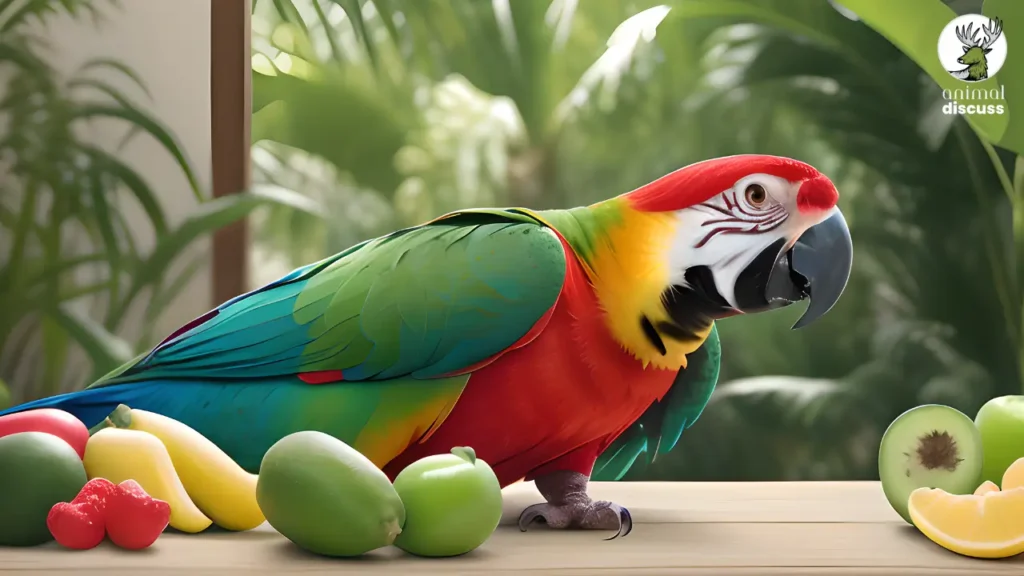
From essentials like fruits and vegetables to tips on managing picky eaters, it’s all here. In this comprehensive guide, you’ll uncover:
- What parrots should and shouldn’t eat
- How to create a balanced diet tailored to your parrot’s species
- Safe human foods and toxic items to avoid
- The role of seeds, nuts, and pellets in their diet
- Strategies to handle fussy eaters
Whether you’re a seasoned parrot owner or a new enthusiast, this guide is your go-to resource for keeping your feathered friend happy and healthy.
Let’s dive into the details of parrot nutrition and ensure your bird gets the best care possible!
What Is the Ideal Diet for Parrots?
A parrot’s diet isn’t just about keeping them full-it’s the backbone of their health and happiness. A balanced diet ensures proper growth, vibrant feathers, and a stronger immune system.
Parrots thrive on a mix of fruits, vegetables, seeds, nuts, and specially formulated pellets. But the right proportions depend on the species.
For instance, larger parrots like macaws may need more nuts, while budgerigars benefit from millet and smaller seeds.
Why Is a Balanced Diet Important for Parrots?
Parrots in the wild eat a variety of foods, ensuring they get all the nutrients they need. A well-rounded diet replicates this diversity, supporting energy levels and mental stimulation.
What Food Groups Are Essential for Parrots’ Health?
- Fruits and vegetables: Rich in vitamins A and C.
- Pellets: Provide essential nutrients often missing in seeds.
- Protein sources: Small amounts of nuts and legumes help muscle development.
How Does Diet Vary Between Parrot Species?
Each species has unique dietary needs. African greys need more calcium, while lorikeets require nectar. Understanding your parrot’s natural diet helps you tailor their meals.
What Fruits and Vegetables Are Safe for Parrots?
Fruits and vegetables are the stars of a parrot’s diet, offering vitamins and antioxidants that enhance their health. These colorful foods mimic what parrots naturally eat in the wild.
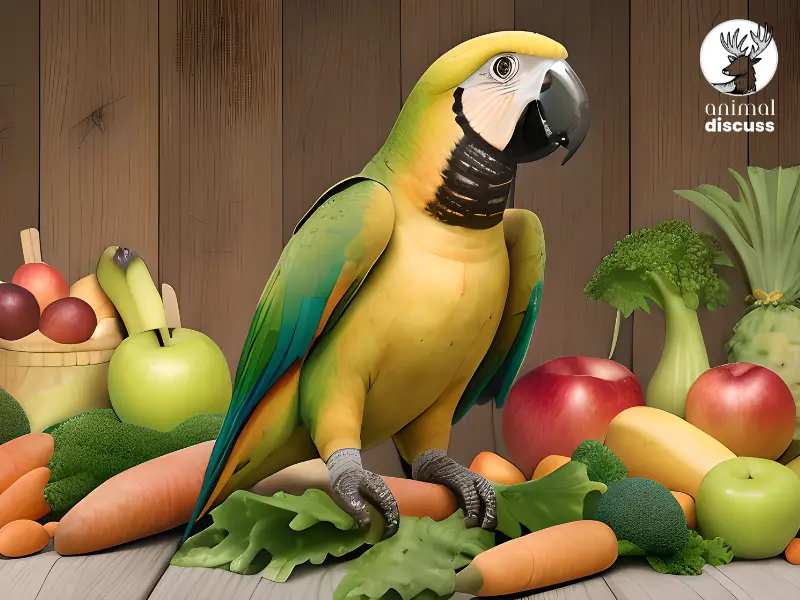
Which Fruits Are Most Nutritious for Parrots?
- Berries: Rich in antioxidants.
- Apples: Great for hydration (remove seeds).
- Mangoes and papayas: Packed with Vitamin A.
What Vegetables Should Be Included in Their Diet?
- Leafy greens: Spinach, kale, and parsley.
- Root vegetables: Carrots and sweet potatoes.
- Cruciferous veggies: Broccoli and cauliflower.
Are There Fruits and Vegetables That Parrots Should Avoid?
Avoid avocado (toxic), onions, garlic, and rhubarb. Some fruits like cherries and peaches have harmful pits that should be removed.
Can Parrots Eat Seeds and Nuts?
Seeds and nuts are synonymous with parrot feeding, but are they all good? While seeds are rich in fats, over-reliance on them can lead to obesity. Nuts are a powerhouse of protein, but moderation is key.
Why are seeds a traditional part of parrot diets? Seeds are easy to source and resemble what parrots eat in the wild. However, they lack essential vitamins and minerals, making them insufficient alone.
How do nuts benefit parrots? Nuts like walnuts and almonds are excellent for mental stimulation, as parrots love cracking them open. They also provide healthy fats and proteins.
What are the risks of an all-seed diet? An all-seed diet can cause malnutrition, obesity, and vitamin deficiencies. It’s crucial to balance seeds with other food groups.
Are Pellets Better Than Seeds for Parrots?
Pellets have revolutionized parrot nutrition, offering a more balanced diet than seeds alone. Designed to include all essential nutrients, pellets are often recommended by avian vets.
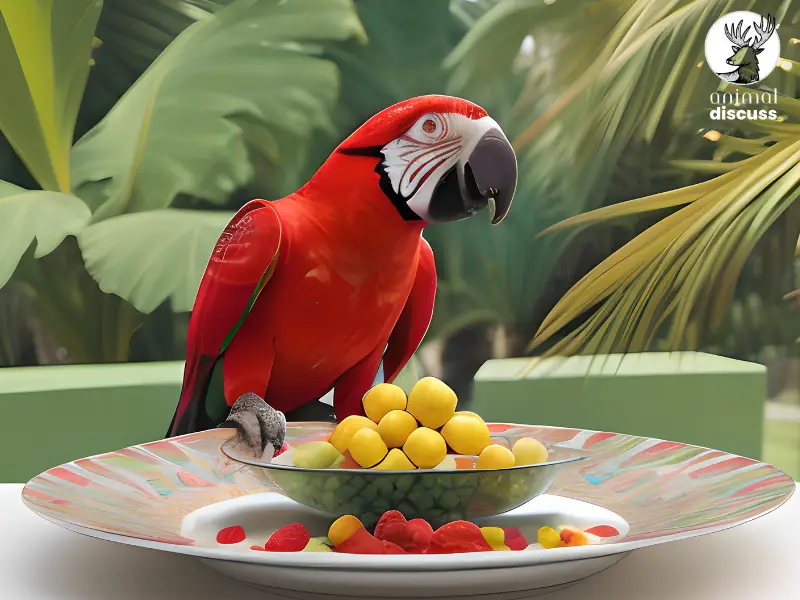
What are pellets, and why are they recommended? Pellets are formulated food made with grains, fruits, and vegetables. They prevent selective eating, ensuring your parrot gets a balanced intake.
How to choose the right pellet brand for your parrot? Look for pellets with natural ingredients and no artificial additives. Brands like Harrison’s or ZuPreem cater to various parrot species.
Can a mix of pellets and seeds improve nutrition? Yes, combining pellets with seeds ensures variety and balance. Use seeds sparingly as treats or supplements.
What Human Foods Can Parrots Eat Safely?
Sharing food with your parrot can be tempting, but not all human foods are safe. Understanding what’s safe ensures their health isn’t compromised.
Which common foods are safe and healthy for parrots? Parrots can eat plain rice, cooked legumes, and whole-grain bread. These foods mimic their natural diet’s variety and nutrition.
What are the dangers of sharing your meals with parrots? Salt, sugar, and spices found in most human meals are harmful to parrots. Avoid processed foods or anything with preservatives.
How to prepare human food for parrots safely? Always serve plain, cooked versions without seasoning. Wash raw ingredients thoroughly to remove pesticides.
What Foods Are Toxic to Parrots?
Parrots are sensitive to many substances that humans can safely consume. Knowing what to avoid can prevent emergencies.
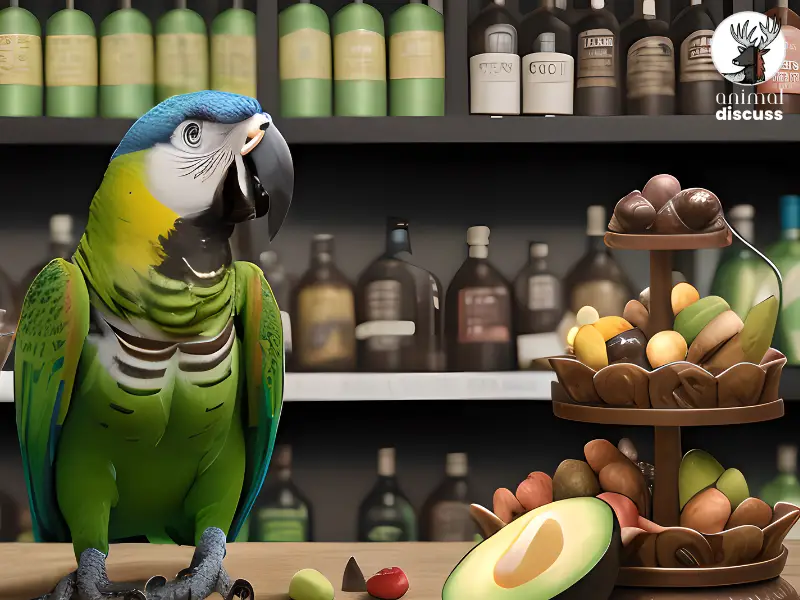
Why are avocados, chocolate, and caffeine harmful? Avocado contains persin, toxic to parrots. Chocolate and caffeine disrupt their nervous system and can be fatal.
Are there less-known toxic foods to watch out for? Avoid foods like apple seeds, which release cyanide when ingested. Alcohol and xylitol (in sugar-free items) are also dangerous.
What should you do if your parrot eats something toxic? Contact an avian vet immediately. Activated charcoal may help, but professional guidance is crucial.
How Often and How Much Should Parrots Eat?
Proper portion sizes and feeding schedules are vital to avoid overfeeding and ensure optimal health.
How to determine portion sizes for parrots? Portions depend on species size and activity levels. For example, cockatiels need less food than macaws.
What is the recommended feeding schedule? Feed parrots twice daily, with snacks or treats in between. Fresh water should always be available.
Why is it important to avoid overfeeding parrots? Overfeeding leads to obesity and reduces activity levels. Monitor their weight and adjust portions accordingly.
Can Parrots Eat Insects or Animal Protein?
While parrots are primarily herbivores, some species occasionally consume protein-rich insects.
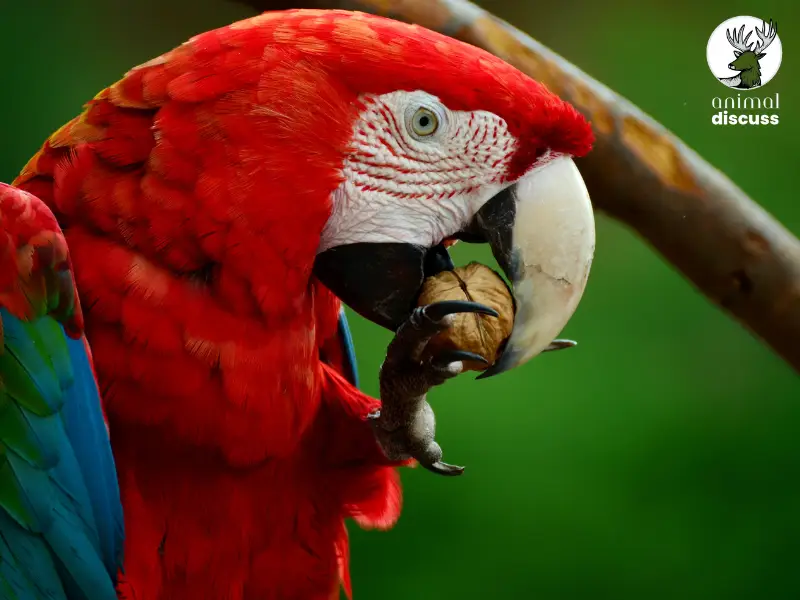
Do parrots need animal protein in their diet? Most parrots get adequate protein from nuts and legumes. However, small amounts of cooked eggs or mealworms can be beneficial.
What insects or protein sources are safe for parrots? Mealworms, crickets, and boiled eggs are safe options. Avoid raw or processed meats.
Are there vegetarian alternatives for protein? Yes, tofu, lentils, and chickpeas are excellent protein sources for vegetarian feeding.
How To Handle Picky Eaters Among Parrots?
Parrots can be stubborn about trying new foods, but patience and creativity can win them over.
Why do parrots sometimes refuse new foods? Parrots are creatures of habit. Unfamiliar textures or colors might make them hesitant.
How to introduce variety into their diet? Mix new items with their favorites. Over time, they’ll get used to the taste.
Are there tricks to encourage better eating habits? Serve food in interesting ways, like skewering fruits or using foraging toys. Positive reinforcement helps too.
How Does Diet Affect a Parrot’s Lifespan and Health?
Diet is directly linked to a parrot’s quality of life. Poor nutrition leads to illnesses and a shorter lifespan.
Why does poor diet lead to common parrot illnesses? Deficiencies can cause obesity, fatty liver disease, and vitamin A deficiency.
How can diet impact feather health and color? A diet rich in nutrients like beta-carotene enhances feather vibrancy and texture.
What role does hydration play in overall wellbeing? Dehydration affects digestion and overall energy. Fresh, clean water is non-negotiable.
Tips For Preparing and Storing Parrot Food
Freshness and hygiene are essential to keep your parrot healthy. Improperly stored food can lead to contamination.
Why is freshness crucial for parrot food? Spoiled food can cause bacterial infections. Always remove uneaten food after a few hours.
How to safely store seeds, nuts, and pellets? Use airtight containers and store in a cool, dry place. Avoid storing in plastic bags.
Are there benefits to preparing homemade parrot food? Homemade mixes let you control ingredients and avoid additives. It’s a great way to ensure quality and freshness.
Final Words
Feeding your parrot isn’t just about keeping them full-it’s about nurturing their overall well-being. A well-rounded diet, rich in fruits, vegetables, pellets, and occasional treats, mirrors what they would enjoy in the wild.
Understanding your parrot’s specific needs ensures they thrive, both physically and mentally. Balancing nutrition, avoiding harmful foods, and maintaining variety are key to their happiness.
With the right approach to their diet, you’re not just feeding them-you’re building a foundation for a healthier, longer life.

